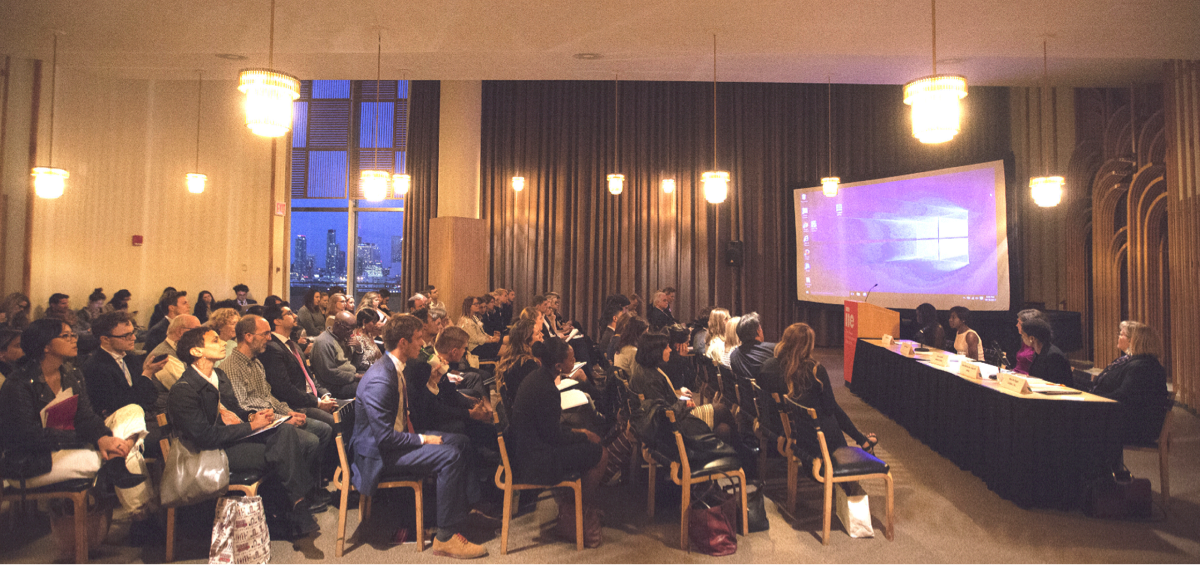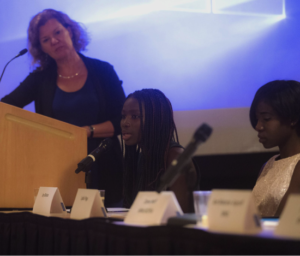The Safe Schools Declaration: Protecting Educational institutions During Conflict

Attendees meeting at the Education Under Fire event. Photo © Southeastern University
The Education Under Fire event hosted by the Institute of International Education on Thursday 12, October focused on the importance of The Safe Schools Declaration and why and how governments support it. The Declaration – opened for endorsement on May 29, 2015, in Norway and led by the Norwegian and Argentinian governments – describes the range of challenges facing educational institutions during a conflict and makes comprehensive recommendations to protect education during crisis. As of now, 69 states¹ have endorsed the declaration – more than 1/3 of the UN member states.
Ambassador Tore Hattrem of Norway and Ambassador Martin Garcia Maritán of Argentina made opening remarks highlighting the importance of working together as governments to protect education during conflict. A panel following the opening remarks consisted of:
- Joy Bishara and Lydia Pogu: Joy and Lydia were among the 276 female students kidnapped by Boko Haram from a government secondary school in Chibok, Nigeria and succeeded in escaping.
- Zama Neff, Co-chair, Global Coalition to Protect Education from Attack
- Ann Makome, UN Department of Peacekeeping Operations
- Sharon Riggle, Chief of Staff, Office of the Special Representative of the Secretary-General for Children and Armed Conflict
“Children and young people are not simply arbitrary victims of armed conflict; on the contrary, they are often deliberately targeted in the very place where they should be safer than anywhere,” stated Ambassador Tore Hattrem of Norway in his opening remarks. He emphasized that the main goal of this declaration is to ensure the military does not use schools and educational facilities during conflict. When educational institutions are used as military bases, they become targets and are no longer protected as civilian objects by international humanitarian law against military attacks. He continued to stress the significance of protecting education by affirming that when we deprive children of education, we all lose out on a generation capable of “building well functioning, democratic, inclusive, and thriving societies.”

Joy and Lydia speaking about their harrowing experiences under Boko Haram. Photo © Southeastern University
Following the remarks were the moving stories of both Joy Bishara and Lydia Pogyu –survivors of the Chibok girls kidnapping. Joy and Lydia shared similarly devastating and touching stories. They were both asleep in school during the attack. It was late at night when they were awakened by the sounds of screaming, gunshots, and Boko Haram’s armed group surrounding their school. “We started to pray for our families back home because we knew that they killed the men and kidnapped the women,” said Joy as she recollected the events of that night. She recalled a man entering the dormitory and threatening them “they just explained horrible things they did and said it’s going to happen to us if we do not follow what they want us to do. They said we should not go back to school if we do, wherever we are we should not think we are safe they are going to come and get us.” The young girls all followed the instructions and climbed into the trucks. As they found themselves moving further away from their hometown, and their school on fire –frightened and full of doubt – they decided to jump off the moving trucks. Injured and bloody, they ran for hours until strangers helped them get back to their families. Although they were terrified to go back to school, they knew they had to tell their stories and continue their education. Joy’s dream is to become a doctor, and Lydia’s is to become a lawyer; both are determined to go back home and make a difference.
Following the moving stories were heartfelt statements by Zama Neff – Co-chair at the Global Coalition to Protect Education from Attack. She recalled the overwhelming stories of hundreds of thousands of children that experience and continue to experience devastating incidents such as Joy and Lydia’s. “I will never forget the little boy in Afghanistan who pointed out where the bomb was left in school, or the teacher in Somalia being in class while Al-Shabaab fighters came in and took girls from his class,” she indicated. With a hopeful voice, she pointed out that “The Security Council has focused attention on attacks on schools as a grave violation against children,” and “Members should show leadership on this issue by endorsing the Safe Schools Declaration and using it to protect schools during war”. At the end of this month, the Security Council will hold an open debate concerning the protection of education facilities and the ban on the military use of schools during a conflict. She announced that five members² of the Security Council are currently supporting the declaration and she is hoping to receive more votes from the remaining member states.
Following statements were made by Ann Makome from the UN Department of Peacekeeping Operations and Sharon Riggle from the Office of the Special Representative of the Secretary-General for Children and Armed Conflict, emphasizing the devastation in areas like Syria, Yemen, and Nigeria. Sharon stated that we still do not know the impact of conflict on the future of a country such as Nigeria where over 1,200 schools were destroyed. Sharon discussed the difficulty for the military to make the decision not to use classes as a base, since most of the times, in these small villages, a school is the only building standing that could host the needs of a military. Through successful incorporation of the protection of schools in the guidelines of the UN military, Ann Makome expressed that we can already see a difference on the ground and that now it’s time for all governments to join voices and endorse the declaration.
By the end of the event, the panel echoed the one concern that was best stated by ambassador Tore Hattrem of Norway: “Education is a human right and a precondition for development – we cannot accept and cannot afford lost generations.”
To learn more about education in emergencies and the Global Business Coalition for Education’s work in supporting children caught in conflict, follow the link here.
1 The following states have endorsed the safe schools Declaration as of October 12, 2017: Afghanistan, Albania, Angola, Argentina, Armenia, Austria, Belgium, Botswana, Brazil, Bulgaria, Burkina Faso, Canada, Central African Republic, Chad, Chile, Costa Rica, Cote D’Ivoire, Cyprus, Czech Republic, Democratic Republic of Congo, Denmark, Ecuador, Finland, France, Georgia, Greece, Honduras, Iceland, Ireland, Italy, Jamaica, Jordan, Kazakhstan, Kenya, Lebanon, Liberia, Liechtenstein, Madagascar, Malaysia, Malta, Montenegro, Mozambique, Netherlands, New Zealand, Niger, Nigeria, Norway, Palestine, Panama, Paraguay, Poland, Portugal, Qatar, Romania, Serbia, Sierra Leone, Slovakia, Slovenia, Somalia, South Africa, South Sudan, Spain, Sudan, Sweden, Switzerland, Uruguay, Zambia
2 The five Security Council members who endorsed the declaration are: France, Italy, Kazakhstan, Sweden, and Uruguay.
